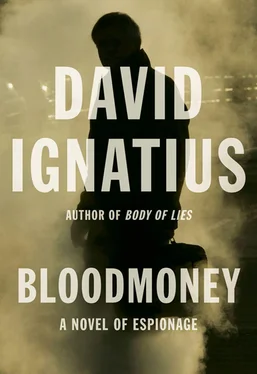David Ignatius - Bloodmoney
Здесь есть возможность читать онлайн «David Ignatius - Bloodmoney» весь текст электронной книги совершенно бесплатно (целиком полную версию без сокращений). В некоторых случаях можно слушать аудио, скачать через торрент в формате fb2 и присутствует краткое содержание. Жанр: Шпионский детектив, на английском языке. Описание произведения, (предисловие) а так же отзывы посетителей доступны на портале библиотеки ЛибКат.
- Название:Bloodmoney
- Автор:
- Жанр:
- Год:неизвестен
- ISBN:нет данных
- Рейтинг книги:4 / 5. Голосов: 1
-
Избранное:Добавить в избранное
- Отзывы:
-
Ваша оценка:
- 80
- 1
- 2
- 3
- 4
- 5
Bloodmoney: краткое содержание, описание и аннотация
Предлагаем к чтению аннотацию, описание, краткое содержание или предисловие (зависит от того, что написал сам автор книги «Bloodmoney»). Если вы не нашли необходимую информацию о книге — напишите в комментариях, мы постараемся отыскать её.
Bloodmoney — читать онлайн бесплатно полную книгу (весь текст) целиком
Ниже представлен текст книги, разбитый по страницам. Система сохранения места последней прочитанной страницы, позволяет с удобством читать онлайн бесплатно книгу «Bloodmoney», без необходимости каждый раз заново искать на чём Вы остановились. Поставьте закладку, и сможете в любой момент перейти на страницу, на которой закончили чтение.
Интервал:
Закладка:
“You want some advice from your new energy analyst?”
“Of course I do. I want to know everything you’re prepared to tell me, about every subject.”
“Okay, then, if my colleagues ask you to do something, and they say it’s legitimate, then get in writing. That’s my suggestion. Don’t go on a patriotic speech and a handshake. In our business, those don’t mean much.”
“I tried that already. I asked Anthony Cronin. He told me it wasn’t possible. He said, ‘Trust me.’ So I did.”
“Oh, Jesus.” She shook her head, and then she laughed. It was funny, really, when dishonest people told you to trust them.
“Let me ask you something,” she said. “Do you think you can get out of this, if you decide that it’s wrong?”
Perkins thought a long moment. He took her hand, and then let it go.
“It would be difficult now. When your people came to me, I had borrowed a lot of money. I had emptied the tank, pretty much, and was running on fumes. They helped me pay off the debts, and then once the system began to work, we were rolling in money. But they have a call on it. They take their share of the profits.”
“You mean they own you?”
“They call it partnership. And it’s so much money now that I don’t really care. I mean, it’s north of ten billion dollars, heading for twenty billion. Even if they take three quarters of it, I’m still absurdly rich.”
“Read the fine print, Tom. These people are killers. That’s what they do. Whereas you’re a nice person, so far as I can tell. I don’t want you to get caught.”
Perkins took off his glasses and rubbed his eyes. He didn’t look quite so young now.
“I am caught, Sophie. That’s the point. We have an expression in economics, ceteris paribus. It means ‘all other things being held constant.’ It allows you to make assumptions and build models. But in this case, all other things aren’t constant. What’s been done can’t be undone. I don’t like what’s happening. It scares me that Howard Egan got killed. If people found out he was a spy, they can find out other things about my business. And then the whole thing will come down.”
Marx took his hand and gave it a squeeze. She wanted to say something encouraging, even if she didn’t fully believe it.
“I don’t know anything about economics. But when I was a girl, my dad liked to tell me, ‘The only way you can be free is by working for yourself.’ In his case, that basically meant doing nothing, but he was right. You’ve got to find a way to get free of this. Maybe I can help you.”
“Smart man, your dad; smart daughter, too. I’m trying. I’m looking for ways to dig out. Maybe we could share a shovel.”
As they neared the Dorchester, Perkins asked, once more, if she wanted to come back with him to Ennismore Gardens for a nightcap. She answered once again that it was a nice idea, really nice, but no, she would not.
24
The people of the Tribal Areas have a fondness for proverbs, and there is one that sounds like this in the Pashto language: “Khar cha har chaire hum law she, bia hum hagha khar we.” The literal meaning is that a donkey will remain a donkey, no matter where it goes. Or, to put it more elegantly: Nature cannot be changed.
When Lieutenant General Mohammed Malik first heard this saying from one of his Pashtun case officers, he knew that it expressed a truth about the people of the frontier region: They were what they were; they could be pushed and prodded, but not changed. Money, flattery, pressure, guns-these might convince the donkey to move a little to the left or right, but they did not change its character. The people lived by their Pashtunwali, their tribal code. Its pillars were personal honor, the obligation to avenge an insult, and the chivalry that allowed the stronger man to be generous toward the weaker one.
General Malik recalled these tenets as he traveled toward Peshawar on his way into the Pashtun heartland. He had received a call the day before from one of his ISI officers in the field. A member of the Al-Tawhid brotherhood had been captured in Bajaur Agency in the far northwest. He was carrying an unusual piece of information that the local case officer did not understand. The man seemed ready to talk, but he was not yet talking. The ISI case officer did not want to pass the information up the chain of command. He wanted General Malik himself to come to Malakand Fort, to interview the Tawhid courier and see his documents.
General Malik set off at dawn in his Land Cruiser. He traveled in a small convoy this time, one vehicle ahead and one behind, with bodyguards armed against an ambush. He planned a stop in Peshawar on the way, to meet with the major general who headed the Frontier Corps, the constabulary force that was supposed to keep the peace in the Tribal Areas and sometimes did.
As the Grand Trunk Road neared the outskirts of Peshawar, a great reddish mound became visible. From a distance it looked like a small hill with a garrison arrayed across the flat-top summit. This was the Bala Hisar fort, which since the sixteenth century had controlled the entry to the Khyber Pass, thirty miles to the west, and thus the gateway between Afghanistan and the great Indus Valley that contained the modern nations of Pakistan and India.
The general’s convoy was waved through a checkpoint and took the steep road up this man-made hillock. In the courtyard atop the fort, a company of Frontier Corps guards mustered for his welcome. They wore the tunics and daggers of the British Raj, and their units were still called by the same names: the Khyber Rifles, the South Waziristan Scouts, the Bajaur Scouts and a half dozen others.
The corps commander greeted him. He was a big man, well over six feet, with a large belly and a growth of stubble on his face. He was a Pashtun himself, the descendant of the princely family that had ruled the ancient trading city of Bannu, a stopping point between Peshawar and Quetta. He knew how to run the frontier in the old-fashioned way, but he was not a man suited for the ISI’s intelligence game. If he encountered an adversary, his instinct was to shoot him, rather than recruit him.
General Malik pumped for information about Al-Tawhid. Was the group still growing in Bajaur and the Waziristans? Was the Tawhid content to attack the Americans and their Afghan allies across the border, or was it threatening Pakistan? The general would never have admitted it to the outside world, but the ISI was prepared to tolerate the Tawhid so long as it didn’t directly challenge the government. A double game was manageable, but not a triple game.
The Frontier Corps commander answered as best he could: Al-Tawhid lived village to village, operation to operation. It had not attacked the Frontier Corps yesterday, or for six months of yesterdays, but it could do so easily tomorrow. Its operatives were here on the frontier, but they were in the settled areas, too: in Karachi and Lahore and Quetta, and in Islamabad itself. General Malik nodded his agreement; he knew the reach of this “brotherhood” too well.
“These Tawhid are cocky buggers,” said the corps commander. “To rule the frontier, you need a big wallet and a big gun. These miscreants have neither, and they have been punished by the drones. But still they think they can take on America. I do not see it. Under their turbans, they are just men. They pretend to know, but what can they know? They are little men with big Korans.”
The corps commander, with his protruding gut and his rough speech, had unwittingly stated the problem that concerned General Malik. What did the Tawhid know? Where did these “little men” get the information that allowed them to poke the giant? The ISI had picked up the chatter, about a learned professor and his secretive ways. But the analysts didn’t understand what it meant, and that troubled the general. There were so many professors on the ISI payroll already; was this master miscreant one of them?
Читать дальшеИнтервал:
Закладка:
Похожие книги на «Bloodmoney»
Представляем Вашему вниманию похожие книги на «Bloodmoney» списком для выбора. Мы отобрали схожую по названию и смыслу литературу в надежде предоставить читателям больше вариантов отыскать новые, интересные, ещё непрочитанные произведения.
Обсуждение, отзывы о книге «Bloodmoney» и просто собственные мнения читателей. Оставьте ваши комментарии, напишите, что Вы думаете о произведении, его смысле или главных героях. Укажите что конкретно понравилось, а что нет, и почему Вы так считаете.












